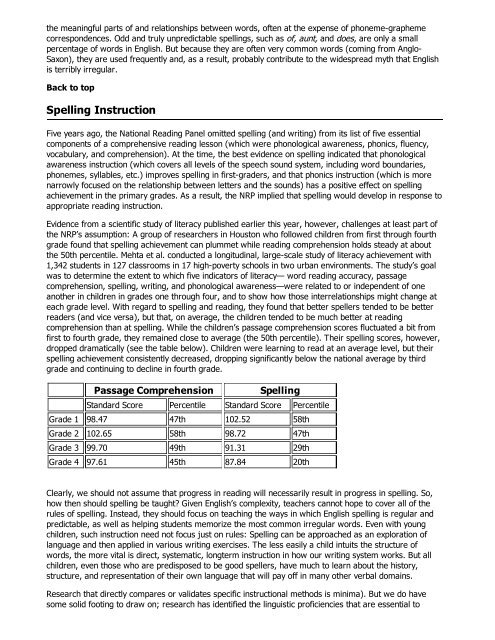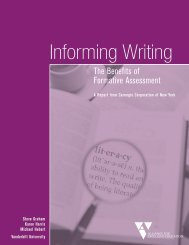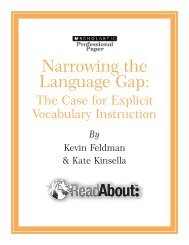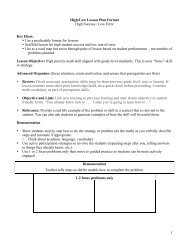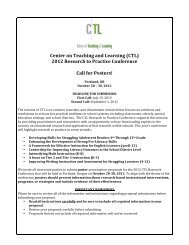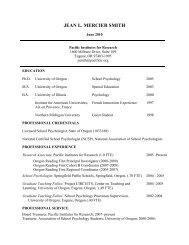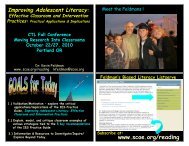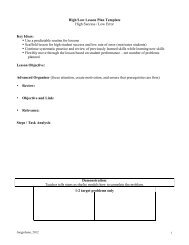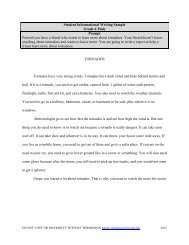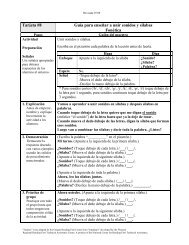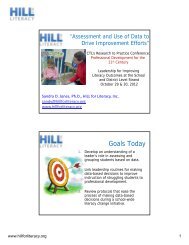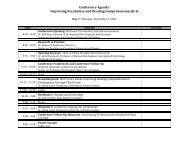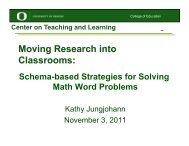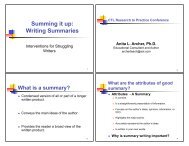Scribes <strong>and</strong> dicti<strong>on</strong>ary writers invented some of these c<strong>on</strong>venti<strong>on</strong>s as our language absorbed new letters,sounds, <strong>and</strong> words from other languages. As an example, let’s focus <strong>on</strong> the three graphemes mostcomm<strong>on</strong>ly used to spell the ph<strong>on</strong>eme /k/: c (cast), k (kitty), <strong>and</strong> –ck (rock). (6) The letter c represents /k/most of the time: It is used in c<strong>on</strong>s<strong>on</strong>ant blends (as in clam, craft, <strong>and</strong> scroll) <strong>and</strong> is usually used beforethe vowel letters a, o, <strong>and</strong> u (as in catch, corncob, <strong>and</strong> cup). The letter k can represent /k/ before anyvowel, but it is almost always used before e, i, <strong>and</strong> y (as in ketchup, kid, <strong>and</strong> kyack); in these cases, theletter k is taking over for c because when c is followed by e, i, or y, it has its soft sound /s/ (as in cent,city, <strong>and</strong> cycle). The letters ck represent /k/ after a stressed short vowel (as in nickel) <strong>and</strong> at the end of<strong>on</strong>e-syllable words (as in back, rock, neck, <strong>and</strong> stuck).Not all c<strong>on</strong>s<strong>on</strong>ant or vowel spellings are that complex, but the choice of grapheme for a given speechsound is often determined by the speech sound that precedes or follows it. Here’s a less complicatedexample: When the sounds /f/, /l/, or /s/ directly follow a short vowel in <strong>on</strong>e-syllable words, a doubled f, l,or s is used to spell the sound (as in staff, will, <strong>and</strong> grass). Even vowel spellings, which can seem terriblycomplicated because they tend to have many graphemes for their short <strong>and</strong> l<strong>on</strong>g sounds, often becomemore predictable when the positi<strong>on</strong> of the vowel sound is c<strong>on</strong>sidered. For example, /ou/ can be spelledwith ou or ow — it’s just a matter of where the /ou/ sound appears. If it is at the beginning of a word, useou (as in out). If it is in the middle of a word or syllable, ou is usually correct (as in mouse <strong>and</strong> house) —except when /ou/ is followed by <strong>on</strong>ly a single n or l (as in brown <strong>and</strong> howl). Lastly, if the /ou/ sound is atthe end of the word or syllable, use ow (as in cow).The spellings of some sounds are governed by established c<strong>on</strong>venti<strong>on</strong>s of lettersequences <strong>and</strong> patternsWhen dicti<strong>on</strong>aries were first written <strong>and</strong> disseminated, rules for spelling had to be st<strong>and</strong>ardized. Scholarslike Samuel Johns<strong>on</strong> <strong>and</strong> Noah Webster worked to accommodate the norms of the day <strong>and</strong> give thelanguage more regularity.To illustrate this principle, we’ll examine the spellings for /v/ <strong>and</strong> /j/. It was not until the 1800s that theletters j <strong>and</strong> v were fully welcomed into the English alphabet.By then, scribes <strong>and</strong> writers of dicti<strong>on</strong>aries had determined that English words would not end with thoseletters because they were easy to visually c<strong>on</strong>fuse with i <strong>and</strong> u, respectively, the letters from which eachwas derived. Though it seems odd to us today, that is why the spelling –ve is always used when theph<strong>on</strong>eme /v/ ends an English word; the combinati<strong>on</strong> prevents a word from ending in plain v. Thus, wordswith short vowels ending in /v/ (have, give, glove) are "regular" from the st<strong>and</strong>point of spellingc<strong>on</strong>venti<strong>on</strong>s. Likewise, because j is not an opti<strong>on</strong> at the ends of words, the speech sound /j/ may bespelled with either –ge or –dge. English uses –dge right after an accented short vowel. Why? Because if itwere not for the extra c<strong>on</strong>s<strong>on</strong>ant protecti<strong>on</strong> of d, the letter e could reach back over the single c<strong>on</strong>s<strong>on</strong>ant g<strong>and</strong> make the vowel say its l<strong>on</strong>g vowel sound (badge, nudge vs. wage, huge).Here’s another example of a spelling c<strong>on</strong>venti<strong>on</strong>: The letter u is a marker for the hard /g/ sound in wordslike guest <strong>and</strong> guide. To see why it is necessary, you’ll need to know <strong>on</strong>e more example of the previousprinciple (that the spelling of a sound can be affected by its positi<strong>on</strong> in a word). Like the letter c, when g isfollowed by e, i, or y, it has its soft sound (/j/ as in gem, gist, <strong>and</strong> gym). So, in the case of guest <strong>and</strong>guide, the letter u intervenes between the g <strong>and</strong> the e or i, requiring the g to have its hard /g/ sound.C<strong>on</strong>venti<strong>on</strong>s like these were developed to help people pr<strong>on</strong>ounce words correctly. C<strong>on</strong>sider the differencesin pr<strong>on</strong>unciati<strong>on</strong> between these words: hopping vs. hoping, hotter vs. hotel, bubble vs. bible, <strong>and</strong> commentvs. moment. In each pair, the first word has a short vowel sound that is "protected" from being a l<strong>on</strong>gvowel sound by the double c<strong>on</strong>s<strong>on</strong>ant.Together, these five principles explain how English can be rich <strong>and</strong> varied, yet c<strong>on</strong>tain words spelled inregular <strong>and</strong> predictable ways. Virtually every word’s spelling can be explained by its language of origin,meaning, <strong>and</strong>/or sound structure. But, as we’ve seen with the many ways to spell /k/ <strong>and</strong> /j/, it’s not as ifwords are simply predictable or not: The predictability of English words exists <strong>on</strong> a c<strong>on</strong>tinuum. Only a fewph<strong>on</strong>eme-grapheme corresp<strong>on</strong>dences work all of the time (regardless of sound sequence), such as in that,must, <strong>and</strong> pan. Most of the corresp<strong>on</strong>dences are predictable, but are determined by the positi<strong>on</strong> of aph<strong>on</strong>eme in a word <strong>and</strong>/or a variety of spelling c<strong>on</strong>venti<strong>on</strong>s. Yet other corresp<strong>on</strong>dences visually represent
the meaningful parts of <strong>and</strong> relati<strong>on</strong>ships between words, often at the expense of ph<strong>on</strong>eme-graphemecorresp<strong>on</strong>dences. Odd <strong>and</strong> truly unpredictable spellings, such as of, aunt, <strong>and</strong> does, are <strong>on</strong>ly a smallpercentage of words in English. But because they are often very comm<strong>on</strong> words (coming from Anglo-Sax<strong>on</strong>), they are used frequently <strong>and</strong>, as a result, probably c<strong>on</strong>tribute to the widespread myth that Englishis terribly irregular.Back to top<str<strong>on</strong>g>Spelling</str<strong>on</strong>g> Instructi<strong>on</strong>Five years ago, the Nati<strong>on</strong>al <str<strong>on</strong>g>Reading</str<strong>on</strong>g> Panel omitted spelling (<strong>and</strong> writing) from its list of five essentialcomp<strong>on</strong>ents of a comprehensive reading less<strong>on</strong> (which were ph<strong>on</strong>ological awareness, ph<strong>on</strong>ics, fluency,vocabulary, <strong>and</strong> comprehensi<strong>on</strong>). At the time, the best evidence <strong>on</strong> spelling indicated that ph<strong>on</strong>ologicalawareness instructi<strong>on</strong> (which covers all levels of the speech sound system, including word boundaries,ph<strong>on</strong>emes, syllables, etc.) improves spelling in first-graders, <strong>and</strong> that ph<strong>on</strong>ics instructi<strong>on</strong> (which is morenarrowly focused <strong>on</strong> the relati<strong>on</strong>ship between letters <strong>and</strong> the sounds) has a positive effect <strong>on</strong> spellingachievement in the primary grades. As a result, the NRP implied that spelling would develop in resp<strong>on</strong>se toappropriate reading instructi<strong>on</strong>.Evidence from a scientific study of literacy published earlier this year, however, challenges at least part ofthe NRP’s assumpti<strong>on</strong>: A group of researchers in Houst<strong>on</strong> who followed children from first through fourthgrade found that spelling achievement can plummet while reading comprehensi<strong>on</strong> holds steady at aboutthe 50th percentile. Mehta et al. c<strong>on</strong>ducted a l<strong>on</strong>gitudinal, large-scale study of literacy achievement with1,342 students in 127 classrooms in 17 high-poverty schools in two urban envir<strong>on</strong>ments. The study’s goalwas to determine the extent to which five indicators of literacy— word reading accuracy, passagecomprehensi<strong>on</strong>, spelling, writing, <strong>and</strong> ph<strong>on</strong>ological awareness—were related to or independent of <strong>on</strong>eanother in children in grades <strong>on</strong>e through four, <strong>and</strong> to show how those interrelati<strong>on</strong>ships might change ateach grade level. With regard to spelling <strong>and</strong> reading, they found that better spellers tended to be betterreaders (<strong>and</strong> vice versa), but that, <strong>on</strong> average, the children tended to be much better at readingcomprehensi<strong>on</strong> than at spelling. While the children’s passage comprehensi<strong>on</strong> scores fluctuated a bit fromfirst to fourth grade, they remained close to average (the 50th percentile). Their spelling scores, however,dropped dramatically (see the table below). Children were learning to read at an average level, but theirspelling achievement c<strong>on</strong>sistently decreased, dropping significantly below the nati<strong>on</strong>al average by thirdgrade <strong>and</strong> c<strong>on</strong>tinuing to decline in fourth grade.Passage Comprehensi<strong>on</strong><str<strong>on</strong>g>Spelling</str<strong>on</strong>g>St<strong>and</strong>ard Score Percentile St<strong>and</strong>ard Score PercentileGrade 1 98.47 47th 102.52 58thGrade 2 102.65 58th 98.72 47thGrade 3 99.70 49th 91.31 29thGrade 4 97.61 45th 87.84 20thClearly, we should not assume that progress in reading will necessarily result in progress in spelling. So,how then should spelling be taught? Given English’s complexity, teachers cannot hope to cover all of therules of spelling. Instead, they should focus <strong>on</strong> teaching the ways in which English spelling is regular <strong>and</strong>predictable, as well as helping students memorize the most comm<strong>on</strong> irregular words. Even with youngchildren, such instructi<strong>on</strong> need not focus just <strong>on</strong> rules: <str<strong>on</strong>g>Spelling</str<strong>on</strong>g> can be approached as an explorati<strong>on</strong> oflanguage <strong>and</strong> then applied in various writing exercises. The less easily a child intuits the structure ofwords, the more vital is direct, systematic, l<strong>on</strong>gterm instructi<strong>on</strong> in how our writing system works. But allchildren, even those who are predisposed to be good spellers, have much to learn about the history,structure, <strong>and</strong> representati<strong>on</strong> of their own language that will pay off in many other verbal domains.Research that directly compares or validates specific instructi<strong>on</strong>al methods is minima). But we do havesome solid footing to draw <strong>on</strong>; research has identified the linguistic proficiencies that are essential to


